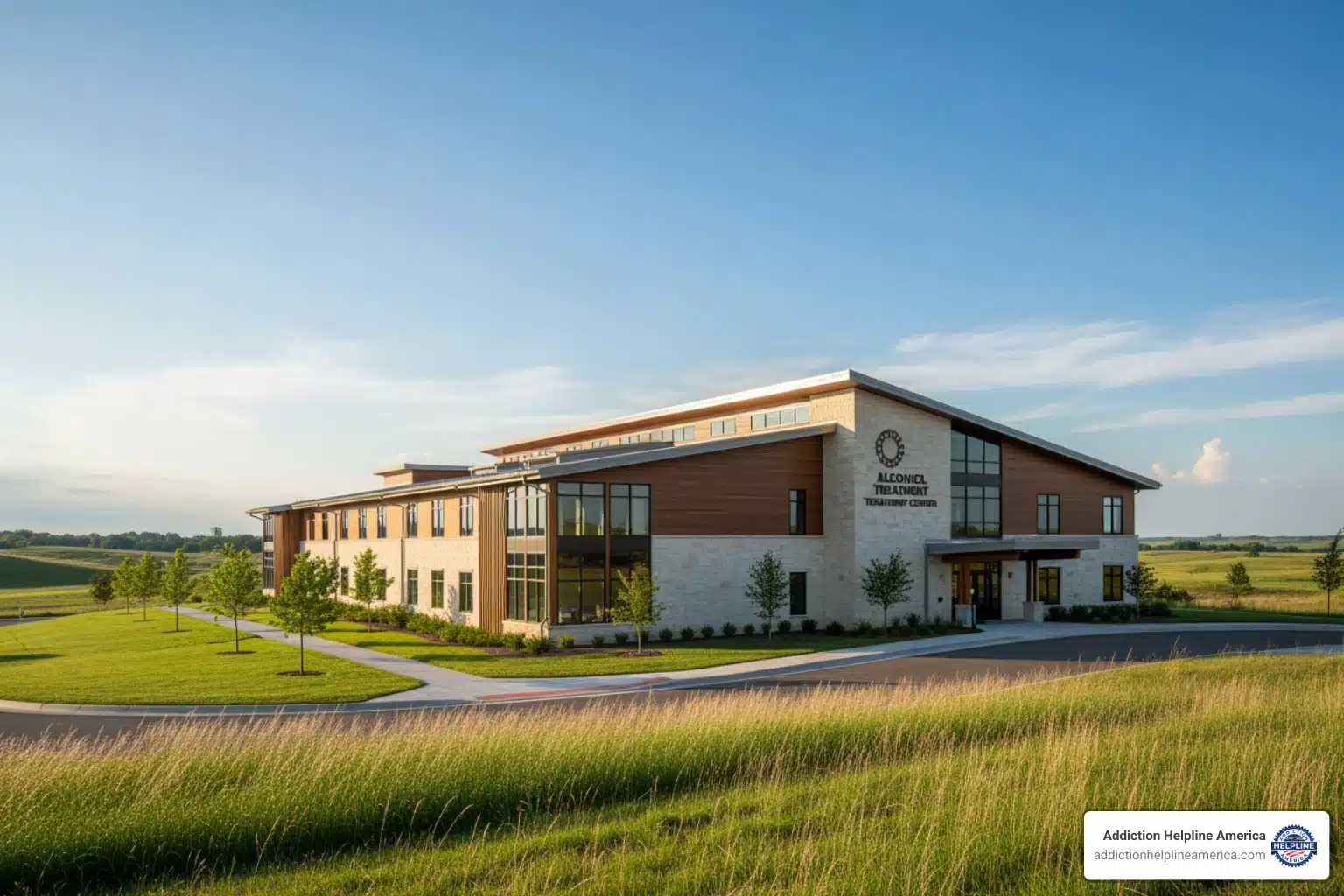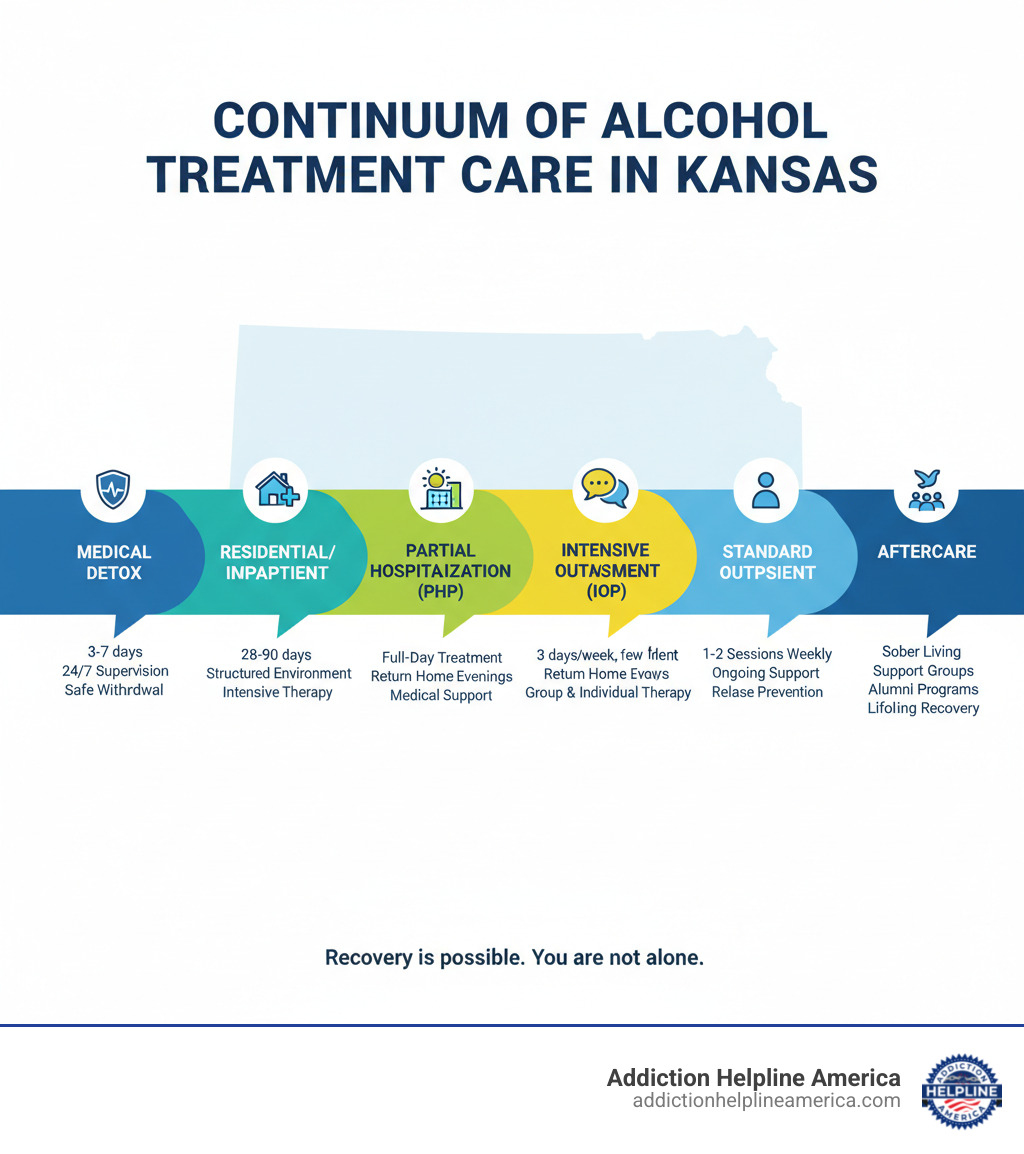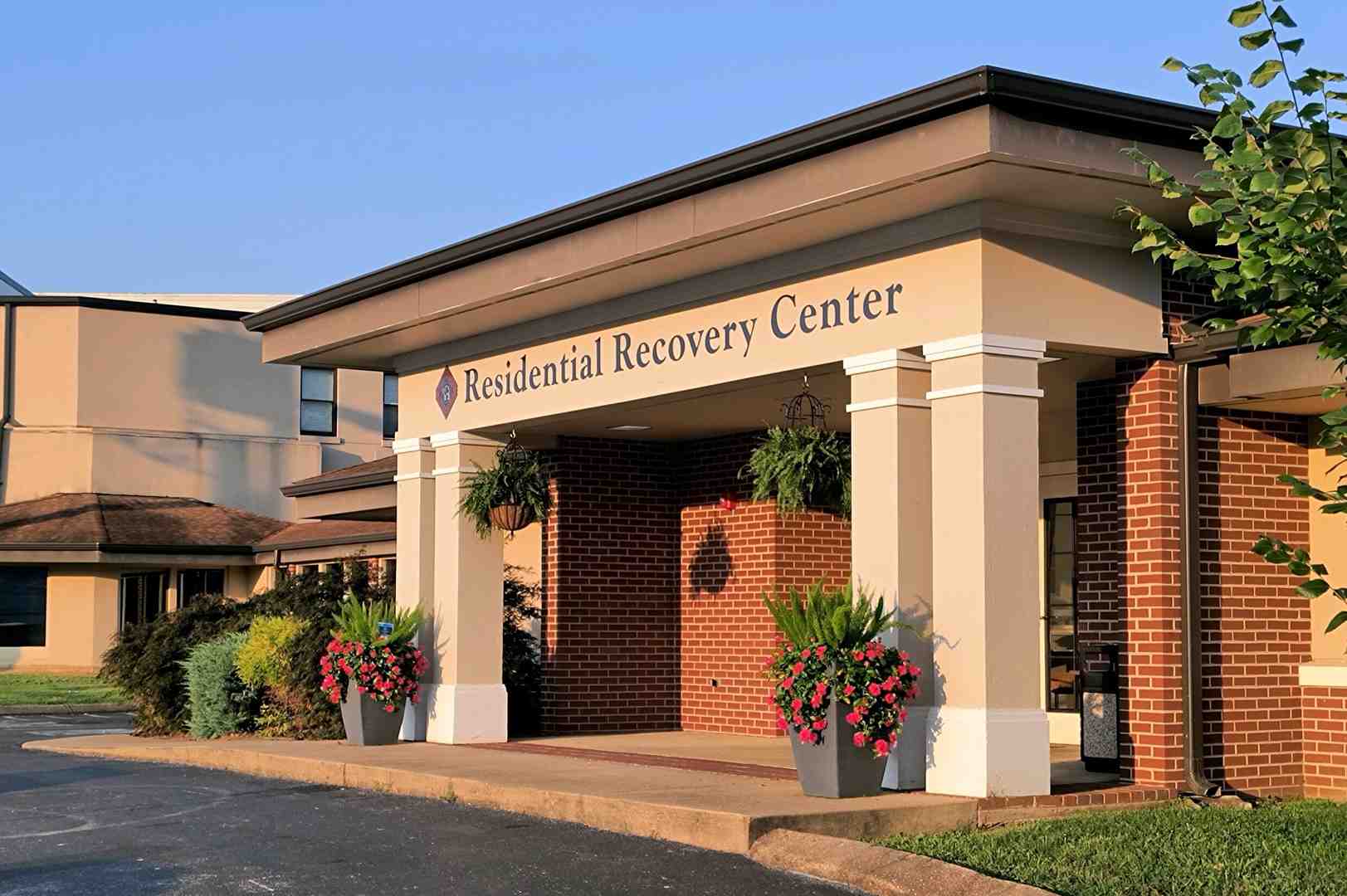
Why Finding the Right Alcohol Treatment Center Matters
Alcohol treatment centers kansas offer a lifeline to the estimated 200,000 Kansas residents struggling with alcohol dependence. The path to recovery can feel isolating, especially with a recent 24% increase in drug-related overdose deaths in the state. But recovery is possible, and Kansas provides a wide range of treatment options to match different needs and life situations.
Quick Guide to Kansas Alcohol Treatment Options:
- Medical Detox: Safe withdrawal management with 24/7 medical supervision.
- Inpatient/Residential: Full-time care in a structured environment (typically 28-90 days).
- Partial Hospitalization (PHP): Intensive day programs while living at home.
- Intensive Outpatient (IOP): Therapy sessions 3-5 days/week for a few hours.
- Standard Outpatient: Ongoing counseling while maintaining daily life.
- Specialized Programs: For teens, veterans, seniors, LGBTQ+ individuals, and faith-based recovery.
This guide will walk you through everything you need to know about finding the right program, from verifying insurance to choosing a facility that gives you the best chance at lasting sobriety. Whether you need immediate detox, long-term residential care, or flexible outpatient therapy, the right help exists.
At Addiction Helpline America, we’ve helped thousands find effective alcohol treatment centers Kansas has to offer. We provide confidential, 24/7 guidance to connect you with programs that match your unique situation, helping you take that first step with clarity and confidence.
Relevant articles related to alcohol treatment centers kansas:
- how much do alcohol treatment centers cost
- is there free alcohol addiction treatment centers
- alcohol treatment centers that accept aetna
Understanding the Landscape of Alcohol Treatment in Kansas
If you’re reading this, you or someone you care about is likely facing the reality of alcohol addiction in Kansas. You’re not alone. Across the Sunflower State’s prairies and cities, approximately 200,000 Kansans are struggling with alcohol abuse or dependence—that’s roughly one in every fifteen residents.
These aren’t just statistics. They’re neighbors, coworkers, parents, and friends. They’re real people navigating a disease that affects every corner of our state, from rural communities to urban centers like Wichita and Topeka.
The challenges Kansas faces extend beyond alcohol alone. Recent data shows a 24% increase in drug-related overdose deaths in a single year—a sobering reminder of how urgent the need for treatment has become. And when we look at mental health, the picture becomes even clearer: an estimated 100,000 Kansans live with serious mental illness, while over one-quarter of adults report having unmet mental health needs.
Why does mental health matter when we’re talking about alcohol treatment? Because addiction rarely travels alone. Many people struggling with alcohol dependence are also dealing with anxiety, depression, PTSD, or other mental health conditions. Treating one without addressing the other is like trying to fix half a problem—it simply doesn’t work.
The good news? Kansas has recognized these challenges and built a system to address them. The Kansas Department for Aging and Disability Services (KDADS) provides state-level oversight for behavioral health services, licensing and regulating treatment providers across the state. You can learn more about their work and find licensed facilities through the KDADS Kansas Licensing Commission.
KDADS also oversees assessment and referral programs through Carelon Behavioral Health of Kansas. If you’re feeling lost about where to start, you can call them at 1-866-645-8216 (select option 2) to connect with assessment services and get information about treatment providers in your area.
What makes Kansas’s approach effective is what healthcare professionals call a continuum of care—a full spectrum of treatment options available for every stage of recovery. Whether you need immediate medical intervention, intensive residential treatment, or ongoing outpatient support, Kansas facilities offer programs designed to meet you exactly where you are in your journey.
Recovery isn’t a straight line. It’s more like a winding path through the Kansas landscape itself—sometimes flat and straightforward, sometimes challenging, but always moving forward. The continuum of care recognizes this reality, providing different levels of support as your needs change throughout recovery.
Core Services Offered at Kansas Facilities
When you start exploring alcohol treatment centers kansas provides, you’ll encounter several core services. Understanding what each one offers helps you make an informed decision about which path might work best for you or your loved one.
Medical detox is often the crucial first step for anyone with severe alcohol dependence. Withdrawal from alcohol can be dangerous—even life-threatening—without proper medical supervision. Kansas facilities offer both acute detoxification treatment for severe withdrawal (with 24-hour observation, monitoring, and counseling) and social detoxification treatment for less severe cases. This medically supervised environment ensures your safety and manages uncomfortable symptoms while your body adjusts to functioning without alcohol.
Inpatient residential care provides the most immersive treatment experience. You live at the facility 24/7, completely removed from the triggers and stresses of daily life. Kansas offers different levels of residential care, including intermediate treatment for individuals with significant impairment who need around-the-clock support, and reintegration treatment for those already in recovery who need continued residential support. Facilities like Valley Hope, with multiple locations across Kansas, have built their reputation on comprehensive residential programs that combine medical care, therapy, and skill-building in a structured environment.
For those who need intensive support but aren’t ready to leave home entirely, Partial Hospitalization Programs (PHP) offer a middle ground. You attend full-day treatment—receiving therapy, learning coping skills, and accessing medical support—but return home each evening. This allows you to begin applying what you’re learning in real-world situations while still having substantial professional support.
Intensive Outpatient Programs (IOP) provide another step down in intensity. Typically involving therapy sessions three days a week for several hours each day, IOPs allow you to continue working, going to school, or caring for family while engaging in structured treatment. If you’re in the Kansas City metro area, outpatient treatment in Olathe offers IOP options that balance recovery with daily responsibilities.
Standard outpatient programs work well for people with milder addiction or as follow-up care after more intensive treatment. You attend regular counseling sessions—perhaps once or twice weekly—while living at home and maintaining your normal routine. This level of care focuses on ongoing support, relapse prevention, and helping you steer real-world challenges as they arise.
At the heart of all these programs is counseling and therapy. Whether through individual sessions, group therapy, or family counseling, therapeutic work helps you understand the root causes of your addiction, develop healthier coping mechanisms, and rebuild damaged relationships. Kansas facilities use evidence-based approaches like Cognitive Behavioral Therapy (CBT) and Dialectical Behavior Therapy (DBT)—proven methods that give you practical tools for lasting recovery. For comprehensive services including counseling and medication-assisted treatment, you can find more info about services in Topeka.
Inpatient vs. Outpatient Treatment: Which is Right for You?
One of the most important decisions you’ll face is choosing between inpatient and outpatient treatment. There’s no universally “right” answer—what matters is finding the approach that fits your specific situation, the severity of your addiction, your home environment, and your support system.
Inpatient treatment (also called residential treatment) means living at the facility full-time, typically for 28 to 90 days or longer. The most significant benefit is 24/7 support and supervision. You’re never alone in your recovery, with medical staff and counselors available around the clock to help you through difficult moments.
The structured environment removes you completely from the triggers, people, and places associated with your drinking. There’s no option to “just have one drink” when you’re craving it—you’re in a protective bubble focused entirely on healing. This immersion can be transformative, especially if your home environment isn’t supportive of recovery.
Inpatient care is particularly recommended if you have severe alcohol addiction, a history of serious withdrawal symptoms, or have tried outpatient treatment without success. It’s also often the best choice for dual diagnosis cases—when you’re dealing with both alcohol addiction and mental health conditions like depression, anxiety, or PTSD that require integrated treatment.
Outpatient treatment allows you to live at home while attending scheduled therapy sessions. The greatest advantage is flexibility. You can continue working, going to school, or caring for family members while getting treatment. This matters enormously for people who can’t afford to take weeks or months away from their responsibilities.
Outpatient programs typically cost significantly less than residential care, making them more accessible for people with limited financial resources or insurance coverage. You also have the immediate opportunity to practice your new coping skills in real-world situations, with your therapist available to help you work through challenges as they happen.
Outpatient treatment works best when you have a strong support system at home—people who support your recovery and an environment free from constant triggers. It’s often ideal for people with less severe addiction, those stepping down from inpatient care, or individuals who have already completed detox and are medically stable.
The honest truth? Many people benefit from starting with inpatient care and then transitioning to outpatient programs as they progress. This approach, called step-down care, provides intensive support when you need it most, then gradually increases your independence while maintaining professional guidance.
At Addiction Helpline America, we help you evaluate your specific situation to determine which level of care gives you the best chance at lasting recovery. We understand that choosing between inpatient and outpatient treatment isn’t just a clinical decision—it’s a personal one that affects your entire life. That’s why we take time to understand your unique circumstances before connecting you with the right program.
Understanding the Landscape of Alcohol Treatment in Kansas
Beneath the surface of the Sunflower State, a sobering reality exists: approximately 200,000 Kansans struggle with alcohol abuse or dependence. This challenge is compounded by a 24% increase in drug-related overdose deaths in recent years and significant unmet mental health needs across the state. Addiction rarely travels alone, and many people battling alcohol dependence also face anxiety, depression, or PTSD.
Fortunately, Kansas has a robust system to address these issues. The Kansas Department for Aging and Disability Services (KDADS) provides state-level oversight, licensing and regulating treatment providers to ensure quality care. You can learn more about their work at the KDADS Kansas Licensing Commission.
This system is built on a continuum of care, offering a full spectrum of treatment options for every stage of recovery. This ensures you can find the right level of support that meets you where you are in your journey.
Core Services Offered at Kansas Facilities
When exploring alcohol treatment centers Kansas provides, you’ll find several core services:
- Medical Detox: The crucial first step for many, providing a safe, medically supervised environment to manage withdrawal symptoms, which can be dangerous without professional care.
- Inpatient Residential Care: An immersive, 24/7 program where you live at the facility, removed from daily triggers. This is ideal for those with severe addiction or who need a structured environment. Options range from Kansas Independence to Kansas Great Bend.
- Partial Hospitalization Programs (PHP): Full-day treatment programs that allow you to return home in the evenings, blending intensive care with real-world application.
- Intensive Outpatient Programs (IOP): A flexible option with therapy sessions several times a week, allowing you to maintain work or family commitments. Our Olathe outpatient treatment location offers IOP options.
- Standard Outpatient Programs: Regular counseling sessions (e.g., once or twice weekly) for those with milder addiction or as a step-down from more intensive care. Local options like Kansas Paola provide accessible services.
- Counseling and Therapy: The foundation of recovery, using evidence-based methods like Cognitive Behavioral Therapy (CBT) and Dialectical Behavior Therapy (DBT) in individual, group, and family settings. You can find comprehensive services at locations like BAART Programs in Topeka.
Inpatient vs. Outpatient Treatment: Which is Right for You?
Choosing between inpatient and outpatient care is a key decision. The right choice depends on the severity of your addiction, your home environment, and your daily responsibilities. Inpatient care offers an immersive, 24/7 supportive environment, while outpatient care provides flexibility to balance treatment with life.
| Feature | Inpatient Treatment (Residential) | Outpatient Treatment (IOP, PHP, Standard OP) |
|---|---|---|
| Living Situation | Live at the facility 24/7 | Live at home, attend scheduled sessions |
| Level of Support | Round-the-clock medical and therapeutic support | Scheduled therapy during program hours |
| Best For | Severe addiction, co-occurring disorders, unstable home environment | Mild-moderate addiction, strong home support, work/family duties |
| Structure | Highly structured daily schedule | Flexible schedule integrated with daily life |
| Duration | Typically 28-90+ days | Varies; from a few hours weekly to full days |
| Cost | Higher (includes room & board) | Lower (no residential costs) |
Inpatient treatment is often recommended for severe alcohol use disorder, co-occurring mental health conditions, or if your home environment is not supportive of recovery. Facilities like Valley Hope in Norton provide this immersive care.
Outpatient treatment works well if you have a strong support system and need to continue with work or family duties. It allows you to practice coping skills in your daily life while receiving professional guidance. Cities like Wichita offer numerous options, including Prairie View Outpatient.
Often, the best path involves starting with a higher level of care and transitioning to outpatient programs. A professional assessment can help determine the right starting point for your unique situation.
Specialized Alcohol Treatment Centers Kansas Offers
Recovery is not one-size-fits-all. The best alcohol treatment centers kansas has to offer provide specialized programs that address the unique needs of different people. Finding a program that aligns with your circumstances and values significantly increases the chances of long-term success.
Programs for Diverse Demographics
Kansas facilities recognize that different groups face distinct challenges:
- Teens and Adolescents: Treatment addresses peer pressure, family dynamics, and the effects of alcohol on the developing brain. For youth-focused services, you can explore treatment options for youth in Garden City.
- Veterans: Programs integrate care for service-related conditions like PTSD alongside addiction treatment. The Robert J. Dole VA Medical Center in Wichita and Valley Hope of Moundridge offer specialized care for veterans.
- Seniors: Therapies consider the physical health concerns, medication interactions, and life transitions common among older adults.
- LGBTQ+ Individuals: Facilities provide a safe, affirming, and inclusive environment where individuals can address addiction without fear of judgment.
- Gender-Specific Programs: Men’s and women’s programs create spaces where individuals can be vulnerable and focus on gender-specific recovery issues. Miracles House in Wichita offers residential care for women, including those with children.
- Professionals: Discreet services and flexible scheduling help doctors, lawyers, and executives achieve sobriety while managing career commitments.
Unique Treatment Approaches in Kansas
Beyond demographics, Kansas centers offer diverse clinical and philosophical approaches:
- Faith-Based Programs: These centers integrate religious principles and spiritual guidance into the recovery process. Adult and Teen Challenge and Miracles, Inc. in Wichita provide faith-centered care.
- Holistic Therapies: A whole-person approach incorporates practices like yoga, meditation, art therapy, and nutritional counseling to treat the mind, body, and spirit. Bel Aire Recovery Center in Wichita exemplifies this comprehensive model.
- Dual Diagnosis Treatment: With many Kansans facing co-occurring mental health disorders, integrated treatment is critical. These programs address conditions like depression, anxiety, and PTSD simultaneously with addiction. Facilities like Prairie View Outpatient in Wichita offer these integrated services.
- Medication-Assisted Treatment (MAT): This approach combines FDA-approved medications like naltrexone (Vivitrol) with counseling to reduce cravings and prevent relapse. If you’d like to learn more about MAT options in Kansas, we can connect you with providers.
How to Choose the Right Alcohol Treatment Center in Kansas
Finding the right treatment center is a critical step in your recovery. Breaking the process down into manageable steps can help you choose a facility that understands your unique situation and offers the support you need.
Key Factors to Consider When Choosing Alcohol Treatment Centers in Kansas
As you explore alcohol treatment centers kansas offers, use this checklist to ensure you’re getting quality care:
- Accreditation and Licensing: The facility must be licensed by the Kansas Department for Aging and Disability Services (KDADS). Look for additional national accreditations from The Joint Commission or CARF, which signify high standards for safety and effectiveness.
- Staff Qualifications: The team should include licensed physicians, therapists, and certified addiction counselors with experience in treating alcohol use disorder.
- Evidence-Based Practices: Ask if the center uses research-backed therapies like Cognitive Behavioral Therapy (CBT), Dialectical Behavior Therapy (DBT), and Motivational Interviewing (MI).
- Treatment Philosophy: Does the center’s approach (e.g., holistic, 12-Step, clinical) align with your personal values and needs?
- Location and Environment: Decide if you’d heal better close to home or far from daily triggers. A comfortable, calming environment can significantly aid recovery.
- Program Duration: A quality center will recommend a program length (30, 60, 90 days, or longer) based on your specific needs, not a one-size-fits-all model.
- Aftercare Support: Recovery continues after treatment. Look for centers with strong aftercare planning, including relapse prevention, sober living connections, and alumni programs.
Navigating Payment and Insurance
Cost should not be a barrier to getting help. There are many ways to afford treatment.
- Verifying Insurance: Most Kansas treatment centers accept private insurance. We can help you confidentially verify your coverage to understand what your policy includes for in-network and out-of-network providers.
- Private Pay Options: If you don’t have insurance, many centers offer payment plans or financing options. While costs vary, outpatient programs are generally less expensive than inpatient care.
- State-Funded and Non-Profit Programs: The Kansas Department for Aging and Disability Services oversees resources for eligible residents. Many non-profits also offer services on a sliding scale based on income.
- Medicaid or Medicare: Some Kansas facilities accept these government-funded insurance programs, which can make treatment highly affordable or free for those who qualify.
Navigating these options can be confusing. Addiction Helpline America offers free, confidential help to verify your insurance and find facilities that match your financial situation.
The Role of Therapy and Long-Term Recovery Support
Stopping drinking is just the first step; building a new, healthier life is the goal. Therapy and long-term support are essential for developing coping skills, healing underlying issues, and navigating the journey to lasting sobriety.
Counseling and Therapy in Kansas Alcohol Treatment Programs
Therapy is the cornerstone of effective alcohol treatment. Alcohol treatment centers kansas offer a variety of approaches to help you build the tools for lasting change.
- Individual Therapy: One-on-one sessions provide a safe, confidential space to explore the root causes of your addiction.
- Cognitive Behavioral Therapy (CBT): This effective approach helps you identify and change the negative thought patterns and behaviors that lead to alcohol use.
- Dialectical Behavior Therapy (DBT): Particularly useful for co-occurring disorders, DBT focuses on managing intense emotions, improving relationships, and practicing mindfulness.
- Group Therapy: Sharing experiences with peers reduces isolation and creates a strong sense of community. You learn from others’ challenges and successes, realizing you are not alone.
- Family Counseling: Addiction affects the whole family. Therapy helps heal relationships, improve communication, and educate loved ones on how to best support your recovery.
- Trauma-Informed Care: This approach recognizes that past trauma often underlies addiction and integrates this understanding into all aspects of treatment, creating a safe environment for healing.
Outpatient facilities, like our outpatient treatment in Olathe and Prairie View Outpatient in Wichita, offer a range of these therapies to support recovery while you maintain your daily life.
Aftercare and Relapse Prevention for Lasting Sobriety
Completing a treatment program is a major accomplishment, but it’s the beginning of your recovery journey. A solid aftercare plan is crucial for long-term success.
- Sober Living Homes: These structured, substance-free homes provide a supportive environment to transition from inpatient care back to independent living. Kansas has a wide range of options, including the well-known Oxford House network.
- Support Groups: Groups like Alcoholics Anonymous (AA) and SMART Recovery offer vital peer support, shared experience, and ongoing encouragement. Finding a local or online meeting provides a powerful sense of community.
- Alumni Programs: Many treatment centers offer alumni programs that keep you connected to a recovery community through events, resources, and continued access to support.
- Ongoing Therapy: Continuing with individual or group therapy after your initial program helps reinforce new skills and address challenges as they arise in sober life.
- Relapse Prevention Plan: This is a personalized roadmap that identifies your triggers, outlines coping strategies, and lists supportive contacts to call when you feel at risk. It’s a proactive tool to safeguard your sobriety.
Frequently Asked Questions about Alcohol Treatment Centers in Kansas
Taking the first step toward recovery brings up many questions. Here are answers to some of the most common concerns we hear when helping people find the right alcohol treatment centers kansas has to offer.
How long does rehab for alcohol addiction last in Kansas?
The length of treatment is custom to your individual needs. Common program durations are 30, 60, or 90 days. However, the best timeline depends on the severity of the addiction, any co-occurring mental health conditions, and your progress. Research shows that longer treatment durations often lead to better long-term outcomes. A professional assessment will help determine the right length for you.
Can I lose my job for attending an alcohol treatment center?
You have legal protections. The Family and Medical Leave Act (FMLA) allows eligible employees to take up to 12 weeks of unpaid, job-protected leave for a serious health condition, which includes addiction treatment. Additionally, the Americans with Disabilities Act (ADA) protects individuals recovering from addiction from discrimination. It’s best to speak with your HR department; conversations are confidential, and many employers are supportive of an employee’s recovery.
What is dual diagnosis treatment?
Dual diagnosis refers to integrated treatment that addresses both a substance use disorder and a co-occurring mental health condition simultaneously. Conditions like depression, anxiety, or PTSD are often intertwined with alcohol addiction. Treating one without the other is rarely effective. An integrated approach addresses the whole person, recognizing that mental health and addiction recovery are deeply connected. Facilities like Prairie View Outpatient in Wichita specialize in this comprehensive care, which is essential for lasting recovery.
Conclusion
If you or a loved one is struggling with alcohol addiction in Kansas, know that recovery is achievable, and you do not have to find the way alone.
Kansas offers a full spectrum of care, from medical detox and residential programs to flexible outpatient options and specialized therapies. The key is finding the program that is the right fit for your unique needs, which can make all the difference for long-term sobriety.
Sorting through these options can be overwhelming. That’s why Addiction Helpline America exists. We provide free, confidential guidance to connect you with a treatment center that matches your specific situation, needs, and budget.
You’ve already taken a courageous step by seeking information. Now, take the next one. Recovery is about building a life you don’t need to escape from.
Find a rehab center that fits your needs and let us help you begin your journey to lasting sobriety today. You deserve a healthier, happier future.
Our helpline is 100%
free & confidential
If you or someone you care about is struggling with drug or alcohol addiction, we can help you explore your recovery options. Don’t face this challenge alone—seek support from us.
Programs
Resources
Will my insurance
cover addiction
treatment?
We're ready to help
Find the best
drug or alcohol treatment
center
Are you or a loved one struggling with addiction? Call today to speak to a treatment expert.















